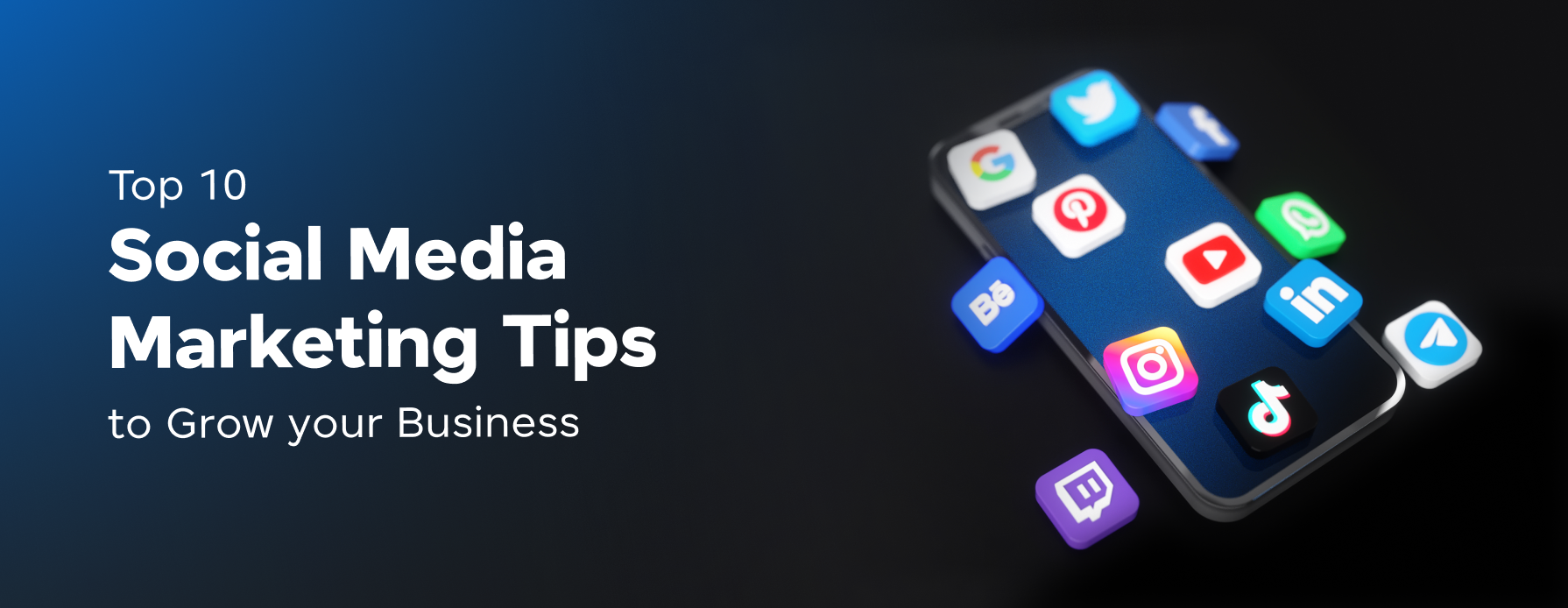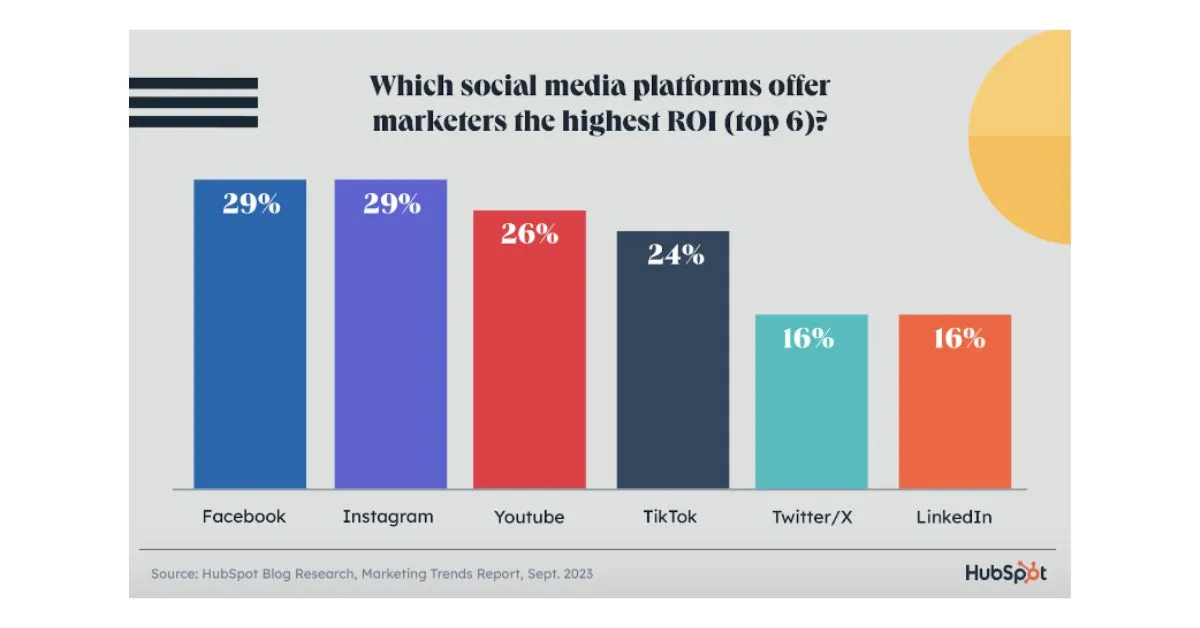
Top 10 Social Media Marketing Tips to Grow Your Business
Mar 11, 2025 5 Min Read 3462 Views
(Last Updated)
In today’s digital age, social media has become an indispensable tool for businesses to connect with their audience, build brand awareness, and drive sales. Social media is growing more than just apps and platforms. It’s a digital environment that’s reshaping the world of marketing.
With millions of users spending hours each day on various social media platforms, it’s crucial for businesses, especially those in the inception stage, to have a strong presence and effective strategies in place. In this blog, we’ll explore the top 10 social media marketing tips tailored for beginners to help grow their businesses.
Table of contents
- Top 10 Social Media Marketing Tips
- Understand Your Audience
- Choose the right Platforms
- Create Compelling Content
- Be Consistent with your efforts
- Communicate & keep your audience active
- Use Hashtags Effectively
- Analyze and Adapt
- Leverage the full potential of Influencer Marketing
- Paid Advertising on Social Media
- Fine-tune Your Social Media Marketing Strategy Frequently
- Wrapping Up
- FAQs
- How social media marketing can grow your business?
- What is SMO?
- How do hashtags help in social media marketing?
- What metrics should I track in social media marketing?
- How often should I post on social media?
Top 10 Social Media Marketing Tips
According to a recent report by Forbes, 90% of users follow at least one brand on social media and 76% of social media users have purchased something they saw on social media. Hence, it is more clear that social media marketing is a huge market that promises high returns. Here is a list of tips to sail through the ship of social media marketing for your business effectively.
Before we move to the next part, Gain a deeper knowledge of business analytics and digital marketing concepts. You can consider enrolling yourself in GUVI’s Business Analytics and Digital Marketing Course, which lets you gain practical experience by developing real-world projects and covering technologies including Power BI, Excel, SQL, Tableau, Data Visualization, etc.
Additionally, if you would like to explore Marketing Research Techniques through a Self-paced course, try GUVI’s Marketing Research Techniques certification course.
1. Understand Your Audience
Before diving into social media marketing, it’s essential to have a clear understanding of your target audience. Who are they? What are their interests, pain points, and preferences?
Find out who your customers will be, what their days are like, how they decide on buying something, what kind of content he/she consumes the most, where they live, etc. With these attributes in mind, segment your personas according to their characteristics such as demographics, motivations, and goals.

Conduct thorough audience research and create buyer personas to guide your marketing efforts. Analyzing audience personas will help find whom your social media content should target, what content you should draft most frequently, etc. Understanding your audience will help you tailor your content and messaging to resonate with them, leading to higher engagement and conversions.
Read More: 8 Steps to Make an Effective Digital Marketing Plan
2. Choose the right Platforms
The average person uses 6.7 different social networks per month. Find out where your audience is most active!
Not all social media platforms are created equal, and it’s crucial to choose the ones that align with your business goals and target audience. Whether it’s Facebook, Instagram, X, or LinkedIn, each platform has its unique demographics, features, and engagement opportunities.

By selecting the right platforms, you can maximize your reach and connect with your audience where they’re most active. Prioritizing which social media channels to concentrate on can potentially be improved by understanding where your audience is most active.
Read More: 16 Types of Digital Marketing: Best Mediums
3. Create Compelling Content
Content is king in the world of social media marketing. Your audience is present on your page for the innovative and informative content you offer. To capture your audience’s attention and keep them engaged, you need to create compelling and relevant content.

Experiment with different types of content such as text, images, videos, GIFs, Polls, and infographics to see what resonates best with your audience. Remember to keep your content informative, entertaining, and valuable to your followers.
Know More: What is Content Marketing? Types, Uses, Strategy
4. Be Consistent with your efforts
Consistency is key to maintaining a strong presence on social media. Establish a regular posting schedule and stick to it. Innovate ideas but don’t forget what worked out for you.

Consistent posting not only keeps your audience engaged but also helps reinforce your brand identity and message. Utilize scheduling tools to plan and automate your posts, ensuring a steady flow of content without overwhelming yourself.
Know About How to Learn Digital Marketing?
5. Communicate & keep your audience active
Social media is not just about broadcasting your message; it’s also about building relationships and engaging with your audience. Take the time to respond to comments, messages, and mentions promptly.
Encourage dialogue and interaction by asking questions, conducting polls, and soliciting user-generated content. By engaging with your audience, you can foster a sense of community around your brand and strengthen customer loyalty.

Must Explore: Top 15 B2B Digital Marketing Strategies [Updated]
6. Use Hashtags Effectively
Hashtags are powerful tools and short routes for increasing the discoverability of your content on social media. Before using hashtags, conduct research to identify relevant ones related to your industry, niche, or topic. Look for popular hashtags that are commonly used by your target audience and align with your content.

Strike a balance between using popular hashtags with high search volumes and niche hashtags with smaller but more engaged communities. Mixing both types of hashtags can help increase your post’s visibility while also reaching a more targeted audience.
Consider creating branded hashtags unique to your brand or campaign. They can help increase brand recognition, encourage user-generated content, and foster community engagement. Make sure your branded hashtags are memorable, relevant, and easy to spell. However, avoid overloading your posts with hashtags as it can come across as spammy. Instead, focus on using a few strategic hashtags that are likely to resonate with your audience and increase engagement.
You might Like: 8 Best YouTube Channels to Learn Digital Marketing
7. Analyze and Adapt
To succeed in social media marketing, you need to be data-driven and constantly analyze your performance metrics. Monitor key metrics such as engagement rate, reach, impressions, and conversions to gauge the effectiveness of your strategies.

Use analytics tools provided by social media platforms or third-party tools like Hootsuite and Sprout Social to track your progress and identify areas for improvement. Based on your findings, adapt your strategies accordingly to optimize your results.
Also Read: Top 7 Reasons Why You Should Learn Digital Marketing
8. Leverage the full potential of Influencer Marketing
Influencer marketing has become a popular strategy for businesses to reach a wider audience and build credibility. Identify influencers in your niche who resonate with your brand values and target audience. Co-create content with popular brands and invite influencers to endorse your brand.

Collaborate with like-minded influencers to create sponsored content, host giveaways, or endorse your products/services. User-generated content (UGC) via Influencers can help amplify your message and introduce your brand to their loyal followers, driving engagement and conversions.
Must Read: Brand Storytelling in the Digital Age: Creating Compelling Content from Scratch
9. Paid Advertising on Social Media
If you want to reap the benefits of social media marketing, really fast then you’ll have to consider social media advertising for your business. Social media advertising is an indispensable component of digital marketing strategies, offering unparalleled reach, targeting capabilities, and measurability for businesses of all sizes.

While organic reach on social media is valuable, paid advertising can help amplify your efforts and reach a larger audience. Platforms like Facebook Ads, Instagram Ads, and LinkedIn Ads offer robust targeting options to ensure your ads are seen by the right people.
Invest in targeted ad campaigns to promote your products/services, boost brand awareness, and drive conversions. Monitor your ad performance and make adjustments as needed to maximize your return on investment.
Also Read: Paid Advertising Vs Content Marketing: A Detailed Comparison
10. Fine-tune Your Social Media Marketing Strategy Frequently
Social media platforms and user behavior evolve rapidly. By continuously refining your strategy, you can stay abreast of emerging trends, new features, and shifts in consumer preferences. This allows you to adapt your approach accordingly, ensuring that your brand remains relevant and resonates with your target audience.
By this, you can effortlessly identify what’s working well and what isn’t. By optimizing your tactics, content, and campaigns based on data-driven insights, you can improve key performance indicators (KPIs) such as engagement, reach, and conversions, leading to better overall results for your business.
Social media users expect fresh, relevant, and engaging content from brands. So, tailor your content accordingly, and create more engaging experiences that resonate with your followers, fostering stronger relationships, encouraging interaction, and boosting brand loyalty.
In times of launching new products, targeting new market segments, or expanding into new regions, refining your strategy allows you to align your social media efforts with your overarching business goals and priorities.
Read more: Digital Marketing Best Practices
Wrapping Up
In summary, social media marketing stands tall as a powerful catalyst for businesses aiming to thrive in today’s digital era. By implementing the top 10 social media marketing tips discussed in the blog, you can establish a strong presence, engage with your audience, and drive meaningful results for your business.
Remember to stay consistent, analyze your performance, and adapt your strategies to stay ahead of the competition. With dedication and strategic planning in place, you can harness the power of social media to take your business to new heights.
Must Explore: 5 Important Pillars of Social Media Marketing
Kickstart your career by enrolling in GUVI’s Business Analytics and Digital Marketing Course where you will master technologies including Power BI, Excel, SQL, Tableau, and Data Visualization, and build interesting real-life business-analytics projects.
Alternatively, if you want to explore Marketing Research Techniques through a Self-paced course, try GUVI’s Marketing Research Techniques certification course.
FAQs
Social media marketing can grow your business by increasing brand visibility and awareness, engaging with your target audience, and driving traffic, generating leads and conversions, building brand loyalty, amplifying reach through shares and viral content, and more.
SMO stands for Social Media Optimization. It involves optimizing a website or content for social media platforms to increase visibility, engagement, and traffic. It focuses on enhancing the shareability of content across social networks, improving social media profiles, and encouraging interaction with users.
The goal of SMO is to amplify brand presence on social media, drive website traffic, and improve overall online visibility and reputation.
Hashtags help increase the discoverability of your content on social media by categorizing and organizing posts around specific topics or keywords. They make your content more visible to users searching for relevant topics or participating in trending conversations.
Key metrics to track in organic social media marketing include engagement rate, reach, impressions, clicks, conversions, and return on investment (ROI).
The frequency of your social media posts depends on your audience, industry, and platform preferences. Aim for consistency rather than overwhelming your followers with too many posts. You can post at least once a day on platforms like Facebook and Instagram, and several times a day on platforms like X.



























![Best Digital Marketing Courses [Free + Paid] 16 Best Digital Marketing Courses](https://www.guvi.in/blog/wp-content/uploads/2023/09/Best-Digital-Marketing-Courses.png)


Did you enjoy this article?